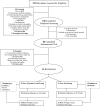Effects of a low-glycemic load diet in overweight and obese pregnant women: a pilot randomized controlled trial
- PMID: 20962162
- PMCID: PMC2980957
- DOI: 10.3945/ajcn.2010.30130
Effects of a low-glycemic load diet in overweight and obese pregnant women: a pilot randomized controlled trial
Abstract
Background: The optimal diet for pregnancy that is complicated by excessive weight is unknown.
Objective: We aimed to examine the effects of a low-glycemic load (low-GL) diet in overweight and obese pregnant women.
Design: We randomly assigned 46 overweight or obese pregnant women to receive a low-GL or a low-fat diet. Participants received carbohydrate-rich foods, fats, and snack foods through home delivery or study visits. The primary outcome was birth weight z score. Other endpoints included infant anthropometric measurements, gestational duration, maternal weight gain, and maternal metabolic parameters.
Results: There were no significant differences in birth weight z score or other measures of infant adiposity between groups. However, in the low-GL compared with the low-fat group, gestational duration was longer (mean ± SD: 39.3 ± 1.1 compared with 37.9 ± 3.1 wk; P = 0.05) and fewer deliveries occurred at ≤ 38.0 wk (13% compared with 48%, P = 0.02; with exclusion of planned cesarean deliveries: 5% compared with 53%; P = 0.002). Adjusted head circumference was greater in the low-GL group (35.0 ± 0.8 compared with 34.2 ± 1.3 cm, P = 0.01). Women in the low-GL group had smaller increases in triglycerides [median (interquartile range): 49 (19, 70) compared with 93 (34, 129) mg/dL; P = 0.03] and total cholesterol [13 (0, 36) compared with 33 (22, 56) mg/dL, P = 0.04] and a greater decrease in C-reactive protein [-2.5 (-5.5, -0.7) compared with -0.4 (-1.4, 1.5) mg/dL, P = 0.007].
Conclusions: A low-GL diet resulted in longer pregnancy duration, greater infant head circumference, and improved maternal cardiovascular risk factors. Large-scale studies are warranted to evaluate whether dietary intervention during pregnancy aimed at lowering GL may be useful in the prevention of prematurity and other adverse maternal and infant outcomes. This trial is registered at clinicaltrials.gov as NCT00364403.
References
-
- Catalano PM, Tyzbir ED, Roman NM, Amini SB, Sims EA. Longitudinal changes in insulin release and insulin resistance in nonobese pregnant women. Am J Obstet Gynecol 1991;165:1667–72 - PubMed
-
- Dahlgren J. Pregnancy and insulin resistance. Metab Syndr Relat Disord 2006;4:149–52 - PubMed
-
- Siega-Riz AM, King JC. Position of the American Dietetic Association and American Society for Nutrition: obesity, reproduction, and pregnancy outcomes. J Am Diet Assoc 2009;109:918–27 - PubMed
-
- Buchanan TA, Metzger BE, Freinkel N, Bergman RN. Insulin sensitivity and B-cell responsiveness to glucose during late pregnancy in lean and moderately obese women with normal glucose tolerance or mild gestational diabetes. Am J Obstet Gynecol 1990;162:1008–14 - PubMed
-
- Huda SS, Brodie LE, Sattar N. Obesity in pregnancy: prevalence and metabolic consequences. Semin Fetal Neonatal Med 2009;15:70–6 - PubMed
Publication types
MeSH terms
Substances
Associated data
Grants and funding
LinkOut - more resources
Full Text Sources
Medical
Research Materials


